Redditor Gets Tricked Into Watching Contagious Dog For A Friend, Wonders If It Would Be Okay To Drop Out
Doing a favor for a friend can sometimes lead to unexpected challenges. OP and his wife had a friend from college who planned a last-minute trip home. Two weeks before his trip, his dog was diagnosed with a contagious disease.
One day before his trip, his sitter backed out due to the fear of infecting another dog. OP and his wife felt bad, so they decided to take the dog in, despite already having a dog and a cat of their own.
The dog puked and had diarrhea on the first day at OP's house. OP called the vet to ask what to do, as the dog was still recovering, and the vet confirmed that it was still contagious. After speaking to other vets, OP and his wife discovered that another vet had told him it was not contagious, even though the dog was still testing positive.
This situation caused OP and his wife to miss work and other events, as they had to take care of the dog from their friend's house and make numerous trips. Both OP and his wife worked full-time, had just moved, and were dealing with personal issues.
On top of this, their friend was being very demanding. This led to OP and his wife spending Christmas Eve and night apart, as someone had to watch the dog.
Now, OP wants to drop the whole thing. Read the full story below:
OP asks:

OP and his wife had a friend from college who planned a last-minute trip home

OP and his wife felt bad, so they decided to take the dog in, despite already having a dog and a cat of their own.

Assessing Responsibility in Pet Care
The responsibilities of pet care extend beyond mere ownership; they encompass emotional and physical well-being.
According to research from the American Psychological Association, pet ownership can significantly impact mental health, yet the stress of unexpected responsibilities can lead to feelings of resentment.
Understanding the psychological burden of caring for a pet, especially one that requires special attention, is crucial for maintaining mental well-being.
It’s important to recognize that it’s okay to express discomfort in these situations and seek alternative solutions.
The dog puked and had diarrhea on the first day at OP's house. After speaking to other vets, OP and his wife discovered that another vet had told him it was not contagious, even though the dog was still testing positive
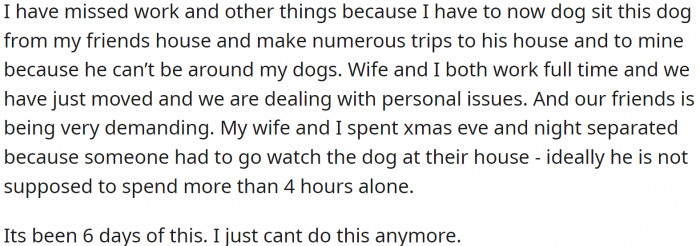
OP has offered the following explanation for why they think they might be the a-hole:

It is clear who is TA here

Research in the field of animal behavior indicates that stress in pet care can lead to anxiety and frustration, particularly when the pet's needs conflict with the caregiver's current circumstances.
These feelings are valid; acknowledging them can help individuals make informed decisions about their capacity for pet care.
Identifying personal limits is essential to prevent emotional burnout and maintain a healthy relationship with animals.
OP responded:

The friend lied about the condition of his dog
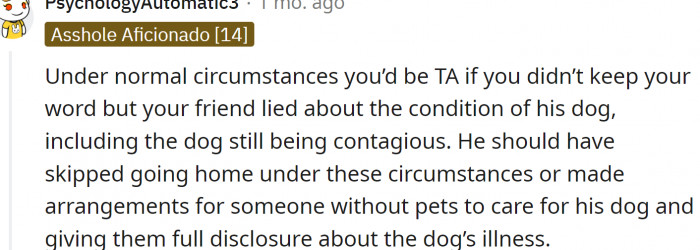
This is actually a good question. Are we so needy for friends that we would call anyone a friend?
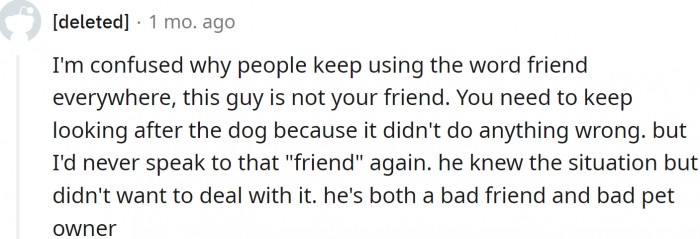
Communication with Friends
When faced with unexpected responsibilities, clear communication is vital.
Studies show that expressing concerns directly can lead to more supportive interactions, reducing feelings of isolation in challenging situations.
Implementing strategies such as using 'I' statements can facilitate a more constructive dialogue, helping friends understand your perspective without feeling attacked.
For instance, expressing discomfort about the situation can lead to a collaborative approach to resolving the issue.
OP and his wife are under a lot of stress

This Redditor shared their experience
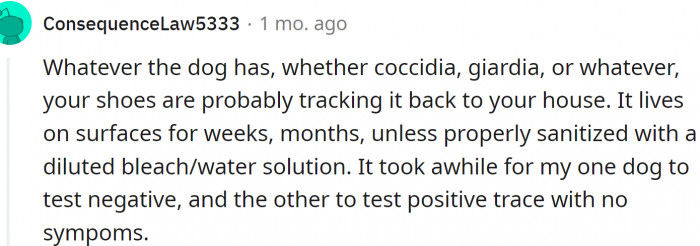
OP replied:

Behavioral psychologists recommend setting boundaries and discussing expectations before taking on any responsibilities, especially in situations involving pets.
Creating a mutual agreement can alleviate potential feelings of obligation and resentment, ensuring all parties are on the same page.
This proactive approach not only fosters understanding but also strengthens friendships by promoting shared responsibility.
Good idea:

“He’s not contagious” vs “He’s low risk but still contagious”
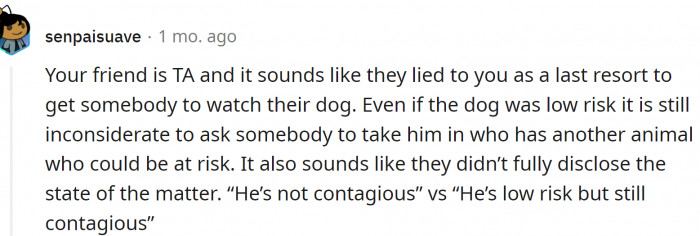
Extremely inconsiderate

People often lie to get friends to do them favors. This is especially common when it comes to asking for help with a task or a difficult situation. They may promise a reward or a favor in return, even though they have no intention of following through. They may also make up stories or even lie outright in order to get the help they need.
It is clear who the a-hole is in this story. OP should drop out of the deal and never speak to this "friend" again.
Psychological Analysis
This scenario reveals the complexities of taking on responsibilities that may not align with one's current emotional readiness.
Recognizing and articulating these feelings can prevent resentment and promote healthier relationships, ultimately allowing for more balanced interactions.
Analysis generated by AI
Analysis & Alternative Approaches
In conclusion, navigating unexpected responsibilities in pet care requires self-awareness and open communication.
Research consistently supports the idea that expressing needs and setting boundaries enhances both personal well-being and the quality of relationships.
Ultimately, understanding and articulating one’s limits can lead to healthier interactions and prevent emotional stress.



